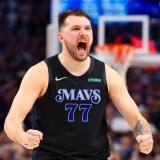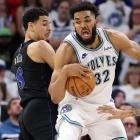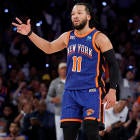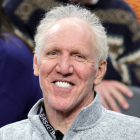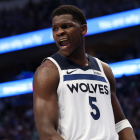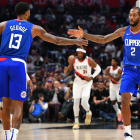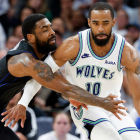Back in the 2012-13 season, we saw the New York Knicks and the Houston Rockets make history from 23 feet, nine inches away -- 22 feet in the corners. Both teams shattered the NBA team record for 3-pointers made in a season, previously held by the 2009-10 Orlando Magic. The Knicks and Rockets eclipsed the mark of 841 made 3-pointers and moved it into a distant third in the record books. They become the sixth and seventh teams, respectively, to make at least 800 3-pointers in a season.
The Knicks set the new team high in the NBA record books at 891 makes. They were a team of chuckers, fueled by Carmelo Anthony's newfound 3-point accuracy and J.R. Smith's affinity for being ready to shoot as soon as the ball was in his gravitational pull as a shooter. Steve Novak and Jason Kidd were the other two high volume 3-point shooters and makers on the roster, but really everybody seemed to have the green light.
The Rockets were a little bit different. Finally having found their new star in James Harden, Daryl Morey's blueprint for being a team that either thrived at the rim or pulled up behind the arc while playing a fast pace of basketball was ready to form. They finished the season with 867 3-pointers, both a significant improvement upon the 09-10 Magic's total of 841 while still being humbled by the Knicks' newly set record.
Both the Knicks and Rockets settled on 28.9 attempts from 3-point range per game that season. New York attempted 2,371 shots from beyond the arc and the Rockets hoisted 2,369. There were different approaches to the way those teams put up their 3's, with the Knicks utilizing a style that resembled a rec league squad and the Rockets employing a style that resembled a D-III college team looking to be an anomaly. The results were the same though; these two teams were historic chuckers and makers.
Prior to last season, I wondered if the new marks set were going to lead to a new round number for teams to shoot for. The "Quest for 900" seemed like an attainable goal because teams were no longer treating 3-point shooting like a fad and were almost all using it as a legitimate weapon after 35 years of chances to experiment with it.
In the 2013-14 season, the Knicks and Rockets fell well off their pace. The Rockets were integrating a second star in Dwight Howard, and they simply just stopped taking as many 3-pointers. They were in search of a balance and ended up taking 190 fewer 3's and making 88 fewer than the previous season.
As for the Knicks, they just sucked and couldn't find the same type of offensive potency with Jason Kidd gone, Raymond Felton playing horrifically, and the team battling so many injuries. They made 759 3-pointers and took only 2,038 of them. Nobody came close to 900 makes or even approaching the records they set the previous season.
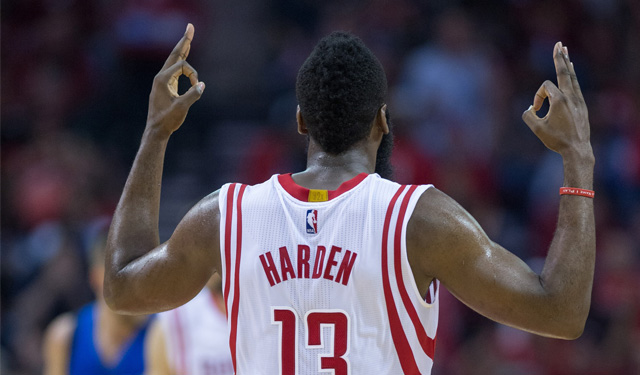
The Rockets have acclimated to having Dwight Howard as a presence and they've found a way to marry feeding him the ball inside, asking guys to avoid long 2's, and peppering the opposition with 3-point attempts this season.
To put their rate of fire into perspective, we've seen ten teams prior to this season attempt at least 26 shots from 3-point range per game. The earliest team was the 2002-03 Boston Celtics, back when Antoine Walker was shooting so many 3-pointers because there weren't any 4-pointers to attempt.
In the record-breaking season for the Knicks and Rockets in 2012-13, both teams were the first franchises in NBA history to attempt at least 28 3-pointers per game. They both settled in at 28.9, but we know the Knicks technically hold the record because they had two more attempts this season. At the rate the 2014-15 Rockets are going, that record-setting average of the Knicks and Rockets is about to look miniscule and archaic.
This season's Houston Rockets offense is currently attempting 34.4 3-pointers per game. That's 5.5 extra attempts per game. They're on pace to shatter the record for both 3's attempted in a season (on pace for 2,817) and 3's made in a season (on pace for 995 makes). Not only would they be the first team to break 900 3-pointers made in a season but their rate has them also being the first team to approach 1,000 made 3-pointers in a season.
The reason the Rockets are able to concentrate on either getting to the basket or getting a shot off behind the 3-point line has been pretty simple: their personnel fits the style much better this season than it did last season. Essentially swapping out Chandler Parsons for wingman Trevor Ariza on the roster and trusting the combination of Jason Terry and Isaiah Canaan to fill in after the departure of Jeremy Lin have been key moves in embracing this style.

It also helps that Patrick Beverley's hard work to become a player that is comfortable shooting the 3 and is capable of attacking the basket has paid off. So far this season, Beverley has taken hardly any shots that don't come at the 3-point line or in the restricted area. He simply shows the patience to avoid being run off the line and settle for a midrange jumper because that's the game plan. He's hitting 46.5 percent from 3-point range so far and 89.1 percent of his shots come from within three feet of the rim or behind the 3-point line.

Ariza has turned himself from an inefficient chucker with good defensive potential to the prototypical "3 and D" wing. His time in Washington really helped him hone the 3-point shooting skill and because of that, he's become brilliant at understanding spacing and taking advantage of finding holes in the defense when he doesn't have the ball.
Ariza is less likely to be run off the 3-point line than Parsons, and while you can argue Parsons is the more potent offensive player, there's a counter-argument that Ariza fits the Rockets' ideal offense because of the way he shoots and the poise he has to stay within his role. Ariza is attempting the second most 3-pointers on the team and has made 36.6 percent of his 3's this season. That's lower than the 37.0 percent Parsons shot last season but he's also taking roughly two more per game than Parsons did.
82.7 percent of Ariza's shots are within three feet of the rim or behind the 3-point line.

While Beverley has established himself as the starting point guard of this team, the replacement of shared duty with Terry and Canaan instead of Lin is also one of those talent downgrades that just happens to be a better fit for what the Rockets like to do. Terry almost never gets to the rim and he can be prone to the side pick-and-roll that ends in a midrange jumper near the baseline, but he still attempts 80.2 percent of his shots either at the rim or behind the arc.
Canaan is the real wildcard here in terms of figuring out just how much the Rockets truly lost when Lin was traded to the Lakers in a salary dump. Canaan is a first round pick from two years ago with a potent 3-point shot and a mentality on offense that is similar to former Rockets' point guard Kyle Lowry. 84.3 percent of Canaan's shots come at the rim or beyond the arc, and as he gains more trust running the second unit in his second season, he'll take over the backup point guard role full time. Lin was fine in his role with the Rockets last season but never an exact fit.

A sneaky replacement for the Rockets this offseason was signing Kostas Papanikolaou to the roster and essentially giving him the Omri Casspi role. With the injury to Terrence Jones, Papanikolaou has been used in a stretch-4 role that helps the Rockets fire away. He has some Manu Ginobili to his game with his playmaking, passing, and outside shooting.
Casspi attempted 65.1 percent of his shots at the rim or beyond the 3-point line last season; Papanikolaou has 3-point attempts alone accounting for 61.7 percent of his shot attempts. He also takes a shot at the rim 22.3 percent of the time, fitting in beautifully to Morey's ideal offense.

James Harden has been the embodiment of the analytical movement in the NBA in terms of offense. Harden is either getting a shot off at the basket, taking a 3-pointer, or finding his way to the free throw line. Those are often the three most efficient ways to score on the court. He probably takes more 2-point shots than the Rockets would like, but he's 1) typically pretty good at them (37.0 percent for his career but just 23.1 percent this season) and 2) a focus of the defense, which means they're likely to concentrate on running him off the 3-point line.
He'll never take a lot of corner 3's for this Rockets team because he's initiating so much of the offense from the top. But he's also responsible for making that initial pass that starts a chain reaction of ball movement that leads to these open 3's. He sucks the defense in perfectly with his dribble penetration and then the opponent's resistance begins to crumble.
The question with the Rockets' strategy, especially when it comes to playoff basketball, is how does this game plan end up working long-term? Can you treat the NBA playoffs like an NCAA tournament and throw a high volume of 3-point shooting in to create variance in the scoring?
When the Rockets had their nearly record-setting 3-point explosion in 2012-13, they finished with the sixth best offense in the NBA at 106.7 points per 100 possessions. Last year, the 3-point attempts dropped by the offensive efficiency rose to 108.6 -- good for fourth in the NBA. As the attempts have risen to a historic rate this season, the offense has been pretty inefficient, which is a bit confusing.
Through 14 games, the Rockets have the 23rd best offense at just 100.5 points per 100. But they sit in the standings at 11-3 because they've managed to adopt a defensive-minded philosophy with everybody improving their defensive capabilities and effort. This was the problem for them in their first round series against the Portland Trail Blazers in 2014; they couldn't stop anybody and the scoring couldn't keep up.
So far this season, the Rockets are giving up 8.5 fewer points per 100 possessions with a healthy Dwight Howard (in terms of his back injury from a couple years ago) patrolling the middle. Their 3-point prowess goes down when he's on the court because you need to involve him in the offense. They're taking "just" 29.8 3-pointers per 48 minutes when Dwight is playing and that number jumps to 38.8 when he's not on the floor.
The only other player that limits their 3-point attempts so much is Terrence Jones. The Rockets put up an average of 25.8 3-pointers per 48 minutes with Jones playing and 36.2 when he's not on the court. When Jones recovers from the peroneal nerve contusion that has kept him out since November 4, we could see a big dip in the 3-point shooting of the Rockets.
Will it dip so low that they're thrown off their current pace of setting the NBA records for 3's taken and made in a season? That's hard to determine. The Rockets were going to shoot an inordinate amount of 3's regardless of which players were on the court this season. They've been gearing toward this marriage of the 3-point line and having multiple stars for a couple of seasons now.
They don't blow anybody away with their 3-point percentage, sitting 14th in the NBA at 35.3 percent. But if you're taking a historic rate of 3's and you're just average, shouldn't that eventually result in tipping the scale of your offensive efficiency and get that 23rd ranked offense to sky rocket as the season progresses? That assumes the rest of the offense improves. Their offense around the rim is pretty inefficient, making just 57.5 percent of their shots in the restricted area (26th in the NBA).
The Rockets believe the 3-point line will be a major piece of the puzzle that takes them to the promise land. You combine that with Howard leading the defensive effort and Harden being the offensive catalyst, the recipe for success makes sense in theory. You still have to apply that to the playoffs though.
And it will be one of the main things to watch as the season progresses. If the Rockets are able to be a title contender in a copycat league by hoisting a historic rate of 3-point attempts, eventually it will just be the standard for those trying to win a championship. 3-point accuracy has been important in this era of title contenders, but 3-point volume could end up being the new trend when we get a large sample size of Daryl Morey's offensive standards.







